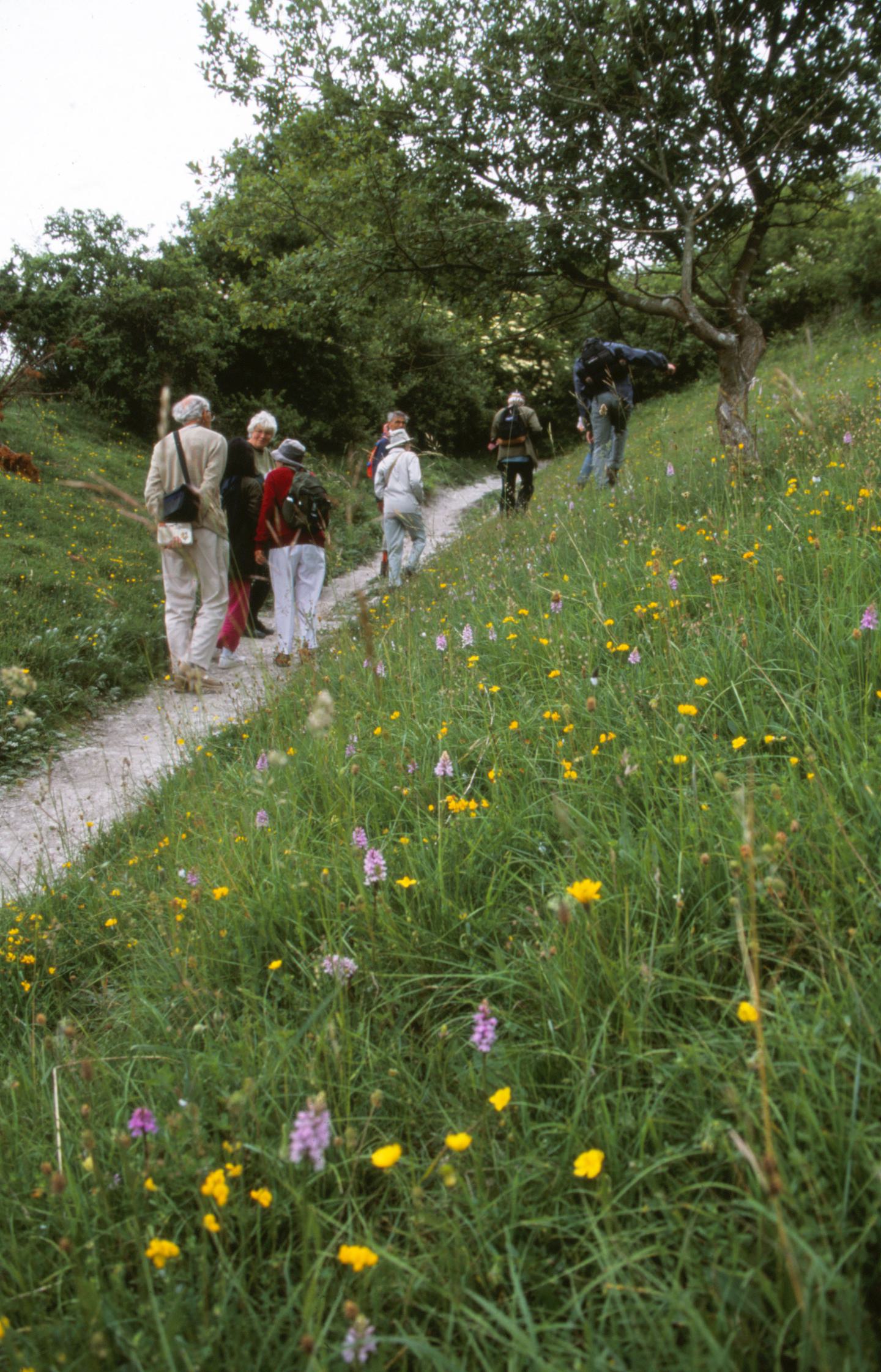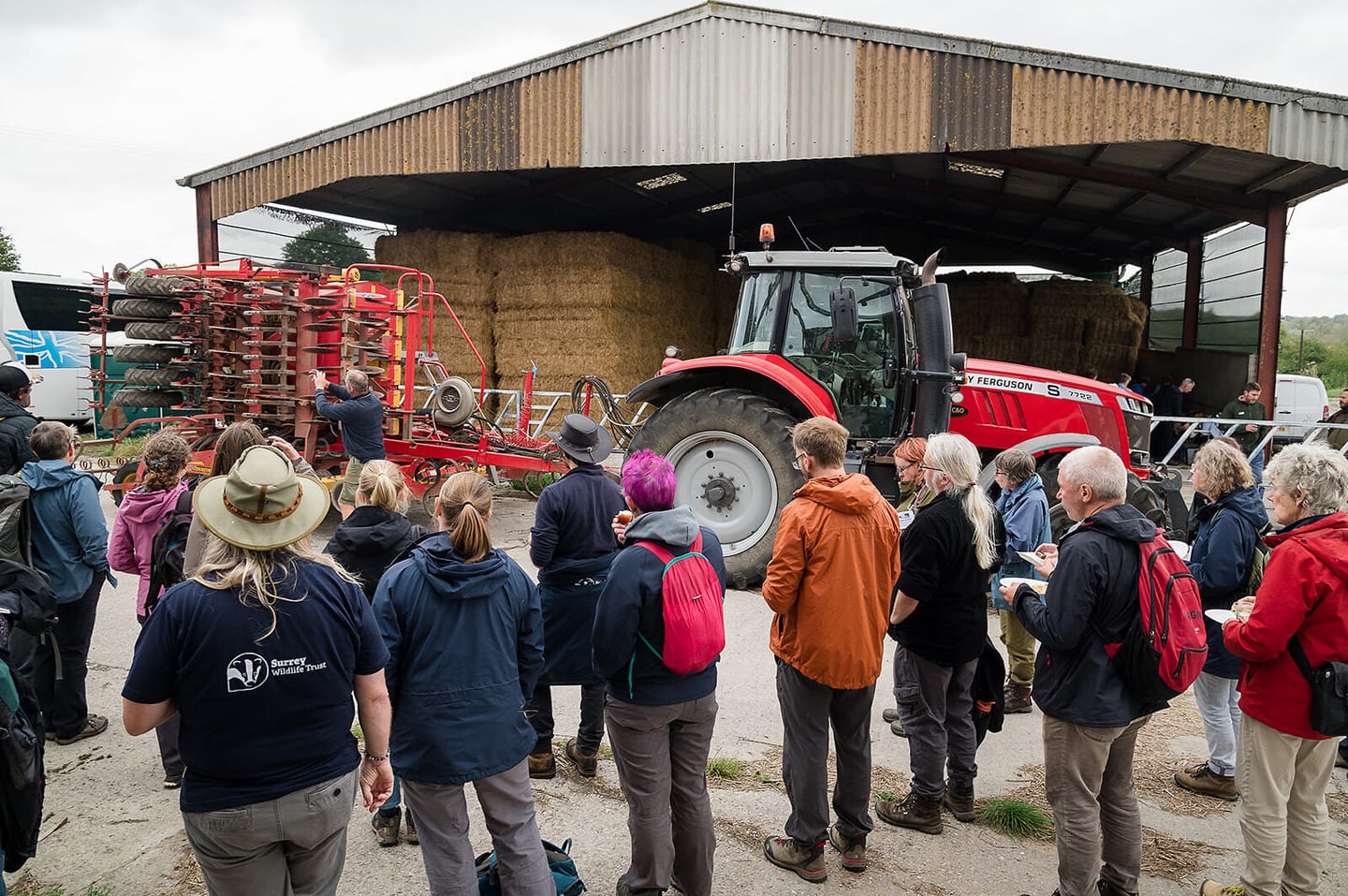The role of partnerships in restoring nature has never been more critical. The environmental challenges we face today are enormous, and no single organisation can address them alone. This is why the Big Chalk initiative is so exciting—it’s about joining forces, combining expertise, and creating a powerful, united movement to restore nature across some of the UK’s most precious landscapes.
Why Big Chalk matters to Wiltshire
Wiltshire is home to two-thirds of Britain’s remaining unimproved chalk downland, a total of 18,000 hectares, which has helped secure Wiltshire’s reputation as the best county for butterflies in England. However, the overwhelming majority of this is concentrated in Salisbury Plain, a military training ground that is now the largest stretch of chalk grassland in northwest Europe.
This special environment – where Great Bustards now roam once more, thanks to the remarkable efforts of the Great Bustard Group - was featured on BBC Countryfile in September, alongside Wiltshire Wildlife Trust’s ‘first-of-its-kind’ Chalkstream restoration project at West Chisenbury. Elsewhere in Wiltshire, chalk downland is fragmented and confined to isolated steep escarpments. Connecting up these precious fragments will be vital to the future resilience of chalk specialists like the marsh fritillary butterfly.
The power of partnership
But Big Chalk’s vision goes beyond connecting fragments. Big Chalk’s ambitious goal is to restore nature’s abundance right across our chalk and limestone landscapes: across one fifth of England, in fact. This can only happen through collaboration—between conservation organisations, farmers, local businesses, government bodies and communities.
Partnerships take work, and it’s easy to get caught up in focusing on individual goals or organisational needs. But the truth is, real change—change at the scale we need—can only happen when we come together. There’s often a temptation to compete for resources or recognition, but nature needs us to put collective impact first.
As Helen Browning, organic farmer and CEO of the Soil Association, once memorably said to me:
“There’s no limit to what you can achieve, as long as you’re prepared not to take the credit for it.”
Proven success through collaboration
The Big Chalk initiative is already seeing successes through partnership-driven projects. One example is a NEIRF-funded project, which will develop a toolkit to help smaller farms measure ecosystem services on grasslands. Led by Plantlife, it brings together partners including Finance Earth, the National Landscapes Association and the Nature Friendly Farming Network, all working toward a shared goal of unlocking green finance for nature, as well as carbon.
Partnerships between NGOs and public bodies are one thing. But to truly succeed, Big Chalk will also need to work closely with the private sector. Chalk stream recovery, for instance, offers a major opportunity for collaboration with water companies. The Sustainable Solutions for Water and Nature (SSWAN) partnership is one promising initiative that seeks to transform water systems for the benefit of nature and people. By aligning with Big Chalk’s goals, these kinds of partnerships could open significant investment opportunities for nature-based solutions.



Farming and conservation: shared goals
Perhaps the most critical partnership for Big Chalk is between conservationists and farmers. Chalk and limestone landscapes are not just places for wildlife—they are productive working landscapes, and many farmers are already playing a vital role in managing their land regeneratively. To achieve nature’s recovery at scale, we need to shift from viewing habitats as isolated pockets of nature to a vision that embraces whole landscapes, farmed in harmony with nature.
As Professor Sir John Lawton himself said in his opening to the Big Chalk Conference,
“We’re not going to achieve 30 by 30 through nature reserves alone. It will happen by working with others who manage land in a nature-friendly way.”
Farmer clusters, like the Pewsey Vale group in the North Wessex Downs, are already leading the way. Farmers are competing with their neighbours to regenerate their soils, minimise their agrichemical use and record the most marsh fritillary butterflies, tree sparrows and breeding lapwing on their land.
By focusing on nature-friendly farming across the landscape—not just in hedgerows but in fields—we can truly restore nature’s abundance. This will require ongoing support, particularly through initiatives like the Farming in Protected Landscapes (FiPL) programme, which has been instrumental in building trust and collaboration between farmers and conservationists.
Volunteers and communities: a critical part of the equation
Volunteers and communities will play a crucial role in Big Chalk’s success.
Through citizen science and conservation efforts, local people can help monitor progress and protect landscapes for future generations. Partnership with local communities is fundamental, as volunteers are vital to day-to-day conservation. Their contributions can be amplified through citizen science projects like Wiltshire & Swindon Biological Record Centre’s Nurturing Nature project. Funded by Cranborne Chase National Landscape, this award-winning initiative has already trained over 100 people, many with little prior experience, to become biological recorders. This highlights the power of community engagement in monitoring and driving nature’s recovery.
By uniting under the Big Chalk banner with a strong, collective voice, we can not only engage governments and funders but also inspire a new and diverse community of volunteers and citizen scientists. The more people we involve, the greater the impact we can achieve together.
Achieving more together
Big Chalk will never be a one-size-fits-all solution. Our strength lies in our diversity—in the independence of local organisations and the grassroots connections we maintain. But together, we can be more than the sum of our parts. Together, we can create a genuinely nature-rich farmed landscape across a fifth of England, restore internationally important grasslands and chalk streams, and build a future where nature thrives alongside people.
At the end of the day, there’s no limit to what we can achieve—if we’re prepared not to take the credit for it.
Joanna Lewis
Chief Executive Officer, Wiltshire Wildlife Trust

Join our partnership
Realising our vision depends on building a broad, representative partnership – we do together what we cannot do alone.
If you would like to discuss joining the Big Chalk Partnership, please email David Hoccom.
Register your project
The Big Chalk programme is made up of a dynamic and evolving suite of partner-led projects. These may do different things, cover different areas and have different partners but they all have two things in common – they contribute towards delivering the Big Chalk vision and the Big Chalk Board has agreed they can be registered as a Big Chalk Project.
Once registered, a Big Chalk Project can use the Big Chalk brand on its materials, benefiting from an enhanced profile as well as access to networking, shared learning and best practice. Importantly, Big Chalk Projects are recognised as being part of a collective effort to secure the future of nature in southern England’s iconic chalk and limestone landscapes.
The registration process begins with submission of an online form.
Join a topic group
Knowledge transfer within the Big Chalk Partnership happens through a series of topic groups, which meet online three to four times a year. These currently cover:
- Land management for nature’s recovery
- Working with farmers and land managers
- Developing landscape-scale programmes
- Local nature recovery strategies
- Evidence, data and recording
- Natural capital
- Health, wellbeing & engagement
If you are interested in joining a Big Chalk topic group, please email Bruce Winney.
Become a funder or partner
We would love to hear from you if your organisation can help fulfil our mission and contribute to delivering our vision of nature-rich chalk and limestone landscapes that benefit all of us.
If you would like to discuss funding or partnering with Big Chalk, please email David Hoccom.



